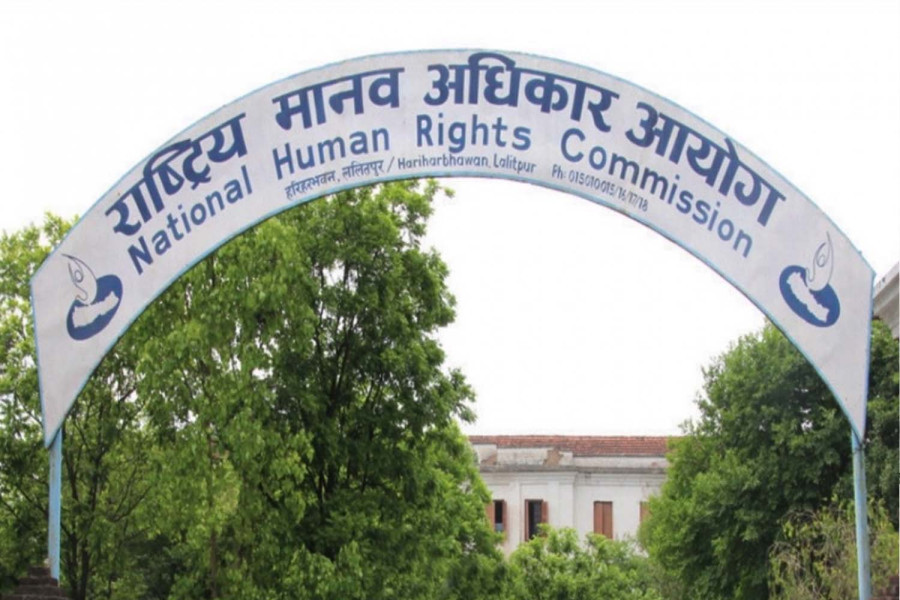National
NHRC wants war crimes and crimes against humanity to be non-amnestiable
National Human Rights Commission unveils report today detailing its efforts and positions on transitional justice.
Binod Ghimire
The National Human Rights Commission has said that the Enforced Disappearances Enquiry, Truth and Reconciliation Commission Act must include war crimes and crimes against humanity as serious violations of human rights while also ensuring justice to former Maoist child soldiers.
The constitutional human rights watchdog made its position public as the three major parties worked to finalise the amendment bill to the Act under consideration in a parliamentary committee. Neither the existing Act nor the amendment bill includes war crimes, crimes against humanity and the issues of child combatants.
In its report “The National Human Rights Commission and Transitional Justice”, the commission has said that together with murder, enforced disappearance, abduction or disappearances after the kidnapping, torture, rape or other sexual violence, war crimes and crimes against humanity should also be classified as non-amnestiable crimes.
The 150-page report the commission is set to unveil on Monday includes its position on the long-pending transitional justice process while also documenting the efforts it made to deliver justice to the war-era victims of human rights violations. Since its establishment in 2002, the commission has investigated 1,073 cases related to the 1996-2006 insurgency and recommended actions against 222 including former Home Secretary and chief of Nepal Police.
Following successive governments’ reluctance to follow its recommendations, the commission made public the list of perpetrators in October 2020 and January 2024.
The leaders in negotiation are still struggling to finalise whether to list murder as a serious violation of human rights. Despite long negotiations, they have yet to sort out issues of minor Maoist soldiers and sentence reduction. They are also divided on whether victims who refuse to reconcile should be allowed to take their cases to court.
The commission’s report says killing any unarmed individual, regardless of their involvement in the conflict, or those not directly involved in the fight, is a serious violation of human rights. There cannot be amnesty for serious violations of human rights, including war crimes and crimes against humanity. Amnesty for other human rights violations is possible only with the written consent of the victims, according to the commission.
“Those who refuse pardon should be allowed to seek legal remedy as per the existing laws,” reads the report. “The truth and Reconciliation Commission must delve into the cases of the victims who lost their lives or got injured in landmines planted during the insurgency even after the peace process began.” Issues of child Maoist combatants must be addressed through the law to ensure they get justice, according to the commission.
The use of minors in armed conflict is a war crime as per international law. The ruling Maoist Centre, therefore, does not want to include this issue in the law.
During the verification process for army integration conducted by UNMIN in 2007, thousands of Maoist fighters had been disqualified for being minors. Among the 4,008 combatants who did not qualify for integration, 2,973 were verified as minors, while the remaining 1,035 had joined the Maoist ‘People’s Liberation Army’ after the first ceasefire of May 26, 2006—six months before the signing of the peace deal.
The government had provided between Rs500,000 and Rs800,000 each to the combatants who chose voluntary retirement. However, those who were disqualified didn’t get any substantial support, except for a few thousand rupees from the United Nations.
A group of former child soldiers led by Lenin Bista have filed a writ petition at the Supreme Court demanding the prosecution of the then Maoist supreme commander Pushpa Kamal Dahal, now the country’s prime minister, and the then ‘people’s government’ chief Baburam Bhattarai, who also is a former prime minister. The final hearing for the petition has been slated for September.
Unlike in other issues, the commission has stood with the political parties on reduced sentencing. “The jail term of convicts who meet the criteria [perpetrators cooperating in the investigation process], can be reduced to a minimum of 25 percent as per existing laws,” reads the report. “The criteria for reduced sentencing can be defined in the law.”
Surya Dhungel, a commissioner, said their position is based on international practice where reduced sentencing is common in transitional justice process.
The commission has also reiterated that it will send its representative to the panel formed to recommend office bearers in the two transitional justice mechanisms only if there is a commitment from the parties concerned to amend the Act. “We are firm in our decision. Commitment from top political leadership is a must for the commission to send its representative to the recommendation committee,” said Dhungel.




 18.12°C Kathmandu
18.12°C Kathmandu














